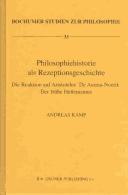| Listing 1 - 1 of 1 |
Sort by
|

ISBN: 9060323602 9786613128089 9027284237 128312808X 9789027284235 9789060323601 Year: 2001 Volume: 33 Publisher: Amsterdam Benjamins
Abstract | Keywords | Export | Availability | Bookmark
 Loading...
Loading...Choose an application
- Reference Manager
- EndNote
- RefWorks (Direct export to RefWorks)
No single theoretician provoked a greater tradition of the reception of his thought throughout changing times and across diverse cultures than did Aristotle, and so Hegel, who calls him the 'teacher of the human race', well describes the man known for ages simply as 'the philosopher'. The present volume examines from a philosophical-historical standpoint the intellect-theory of De Anima III 4-5, which stands in the center of the Aristotelian system and composes one of the most provocative Aristotelian theories. It concentrates on the critical engagement with Aristotle's conception of nous in Theophrastus and his colleagues (Dicaearchus, Aristoxenus) and students (Demetrius of Phaleron, Menander, Erasistratus) in the Peripatos as well as in the Academic, Socratic, Epicurean and Stoic schools. The analysis of the relevant texts leads to a new assessment of Theophrastus's philosophical-historical significance in the Aristotelian tradition and documents that in early Hellenism the Aristotelian theory itself played a surprisingly limited role, so that the loss of the original Aristotelian manuscripts as reported by Strabo and Plutarch - a matter hotly debated in recent studies - was of only marginal importance.Kein Theoretiker provozierte über eine ähnlich lange Zeitspanne eine so intensive, kontinuierliche und multikulturelle Rezeption wie Aristoteles. Die Geschichte der Philosophie verlangt es daher geradezu, unter der Perspektive der ebenso konstanten wie vielgestaltigen Auseinandersetzung mit "dem Philosophen" analysiert zu werden. Den geeignetsten Kristallisationspunkt hierfür stellt die in "De Anima" G 4-5 präsentierte Nous-Theorie dar, denn zum einen stand sie im Zentrum des aristotelischen "Systems", zum anderen handelt es sich bei ihr um die mit gröîter Kontinuität, höchster Intensität und unterschiedlichsten Resultaten rezipierte philosophische Theorie überhaupt.Der vorliegende Band thematisiert, im Anschluî am die "Topographie" der aristotelischen Noetik, die frühhellenistische Resonanz. Den ersten Schwerpunkt bildet Theophrasts philosophisch-kritische Auseinandersetzung mit der Nous-Konzeption seines Lehrers, den zweiten die "De Anima"-Rezeption in der damaligen Philosophie-Szene, die im wesentlichen durch drie Gruppen konstituiert wurde: Theophrasts Kollegen im "Peripatos" (Dikaiarch, Aristoxenos); Theophrasts eingene Hörerschaft (Demetrios v. Phaleron, Menander, Erasistratos); und die zahlreichte philosophische Konkurrenz: die "Akademiker", "Sokratiker", und die Schulen Epikurs bzw. Zenons. Die Analyse der relevanten Texte führt erstens zu einder grundsätzlichen Neubewertung der philosophiehistorischen Position Theophrasts. Zweitens dokumentiert sie, daî die aristotelische Theorie entgegen der heutigen opinio communis gerade im Frühhellenismus eine erstaunlich bescheidene Rolle spielte. Rezeptionsgeschichtlich kommt dem von Strabon/Plutarch berichteten und in der neueren Forschung heiîdiskutierten Verlust der aristotelischen Originalmanuscripte deshalb allenfalls eine sekondäre Bedeutung zu.
Ancient philosophy --- Antieke filosofie --- Filosofie [Antieke ] --- Filosofie [Griekse ] --- Filosofie [Romeinse ] --- Filosofie van de Oudheid --- Greek philosophy --- Griekse filosofie --- Philosophie ancienne --- Philosophie antique --- Philosophie de l'Antiquité --- Philosophie grecque --- Philosophie romaine --- Philosophy [Ancient ] --- Philosophy [Greek ] --- Philosophy [Roman ] --- Roman philosophy --- Romeinse filosofie --- Intellect --- Philosophy, Ancient --- Philosophy, Greek --- Philosophy, Roman --- Human intelligence --- Intelligence --- Mind --- Ability --- Psychology --- Thought and thinking --- History --- Aristotle. --- Theophrastus. --- Theophrastus --- Théophraste --- Aristotle --- Feofrast --- Theophrast --- Théophraste --- Theophrastos --- Teofrasto --- Theophrastus, --- Θεόφραστος --- Philosophy, Ancient. --- History.
| Listing 1 - 1 of 1 |
Sort by
|

 Search
Search Feedback
Feedback About UniCat
About UniCat  Help
Help News
News